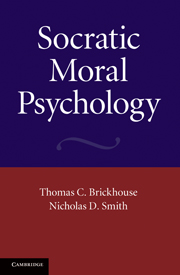Book contents
- Frontmatter
- Contents
- Acknowledgments
- Introduction
- 1 Apology of Socratic studies
- 2 Motivational intellectualism
- 3 The “prudential paradox”
- 4 Wrongdoing and damage to the soul
- 5 Educating the appetites and passions
- 6 Virtue intellectualism
- 7 Socrates and his ancient intellectual heirs: Plato, Aristotle, and the Stoics
- Appendix: is Plato's Gorgias consistent with the other early or Socratic dialogues?
- Bibliography
- Index of passages
- General index
6 - Virtue intellectualism
Published online by Cambridge University Press: 04 August 2010
- Frontmatter
- Contents
- Acknowledgments
- Introduction
- 1 Apology of Socratic studies
- 2 Motivational intellectualism
- 3 The “prudential paradox”
- 4 Wrongdoing and damage to the soul
- 5 Educating the appetites and passions
- 6 Virtue intellectualism
- 7 Socrates and his ancient intellectual heirs: Plato, Aristotle, and the Stoics
- Appendix: is Plato's Gorgias consistent with the other early or Socratic dialogues?
- Bibliography
- Index of passages
- General index
Summary
VIRTUE, HAPPINESS, AND KNOWLEDGE
Introduction
As we said in the Preface to this book, references to Socrates' “intellectualism” may either refer to his intellectualism about the nature of virtue or to his intellectualism about human motivation. The two forms of intellectualism are, indeed, connected in Socratic philosophy, though as we have now shown, scholars have not interpreted the motivational side of this connection correctly. In this chapter, we will consider how our new interpretation of Socrates' motivational intellectualism is related to his virtue intellectualism.
Any attempt to clarify Socrates' motivational and virtue intellectualism must at some point come to terms with his position regarding Socrates' well-known claim that all virtue is really nothing but a kind of knowledge – knowledge of good and evil. And, because it is the same knowledge that constitutes each of the several virtues, in some sense all of the virtues turn out to be the same. This is Socrates' famous view of the “unity of the virtues,” which will be the main focus of the first part of this chapter. Our conclusions regarding the sense in which the virtues are the same and the sense in which they are distinguishable has not changed appreciably since we first advanced it in 1994. We believe that the discussion is worth revisiting here because in the intervening years a number of important studies have appeared that make far clearer than we did exactly what challenges a successful account of the unity of the virtues must meet.
- Type
- Chapter
- Information
- Socratic Moral Psychology , pp. 153 - 192Publisher: Cambridge University PressPrint publication year: 2010



